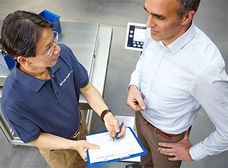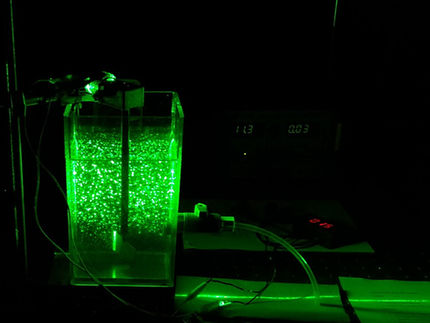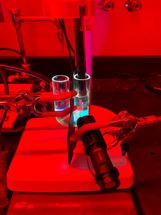New adsorption process makes headway in the United States
Iron hydroxide proves to be a highly effective adsorbent
SORB 33TM is the name of a process that uses Bayoxide® E33 granules to remove arsenic from drinking water. It has been developed by Severn Trent services in cooperation with Bayer Chemicals, and is now about to make a breakthrough in the United States. "The United States Environmental Protection Agency (USEPA) intends to use our technology for six of its twelve Phase I demonstration projects for removing arsenic from drinking water," says a delighted Tom Mills, Vice President of Severn Trent Services, Fort Washington (Pennsylvania). As the national environmental regulatory authority, the USEPA is responsible for researching, developing and enforcing the standards for a variety of environmental programs. In addition, there has been a positive response to SORB 33TM in over 30 local projects for the treatment of drinking water spread over the entire USA. Interest in the new adsorption process in the United States is particularly great because, following a decision by the USEPA in October 2001, a threshold of 10 micrograms of arsenic per liter (µg/l) of drinking water will come into force throughout the country from 2006. Many regions and water suppliers are affected, and they must now take measures to comply with the stricter threshold by implementing a cost-effective and commercially proven arsenic removal technology, and above all to protect the water consumers. Various medical studies had shown that by drinking water with a high arsenic content over a long period, consumers can get skin disorders (hyperkeratosis) and, at worst, carcinomas. A link has also been established between arsenic and other kinds of cancer. "In fact, it isn't usually from industrial sources that the semi-metal gets into the groundwater, but rather it is dissolved out of natural ores and minerals," says Dr. Andreas Schlegel, the Arsenic Project Manager at Bayer's Krefeld-Uerdingen site.
The SORB 33TM adsorption process is currently proving its worth in more than 15 commercial water treatment plants in the UK. At the beginning of 2003, it was treating around 176 million liters of drinking water a day. "As a commercially proven arsenic removal treatment technology, the market potential for SORB 33 in the United States is great" says Mills, his eyes on the future.
The heart of SORB 33TM is a fixed bed, through which the contaminated water flows. The bed consists of iron hydroxide granules - Bayoxide® E33 - which have been specially developed for Severn Trent by Bayer Chemicals. The granules have very finely structured surfaces in the nano range, which adsorb the arsenic. "Thanks to their high capacity, the granules last a lot longer than other conventional adsorbers such as activated carbon and activated aluminum oxides. This means they have to be replaced less often which, in turn, means greater economic efficiency," says Dr. Hendrik Kathrein, Marketing Manager at Bayer Chemicals. Apart from that, they flow much more easily than powders and are easier to handle. For Severn Trent, a particularly important argument in favor of purchasing the Bayer product was that Bayer Chemicals is able to supply large quantities of the granules to meet the mounting demand - also in the short term - both to Europe and to the American continent.
Other news from the department research and development
These products might interest you

Good Weighing Practice by Mettler-Toledo
Your Concrete Weighing Quality Assurance Plan
GWP Verification service

Milli-Q® Services / MyMilli-Q™ by Merck
Services & Support for Water Purification Systems
Quality Care, Delivered. In Person & Online

Get the chemical industry in your inbox
By submitting this form you agree that LUMITOS AG will send you the newsletter(s) selected above by email. Your data will not be passed on to third parties. Your data will be stored and processed in accordance with our data protection regulations. LUMITOS may contact you by email for the purpose of advertising or market and opinion surveys. You can revoke your consent at any time without giving reasons to LUMITOS AG, Ernst-Augustin-Str. 2, 12489 Berlin, Germany or by e-mail at revoke@lumitos.com with effect for the future. In addition, each email contains a link to unsubscribe from the corresponding newsletter.




























































